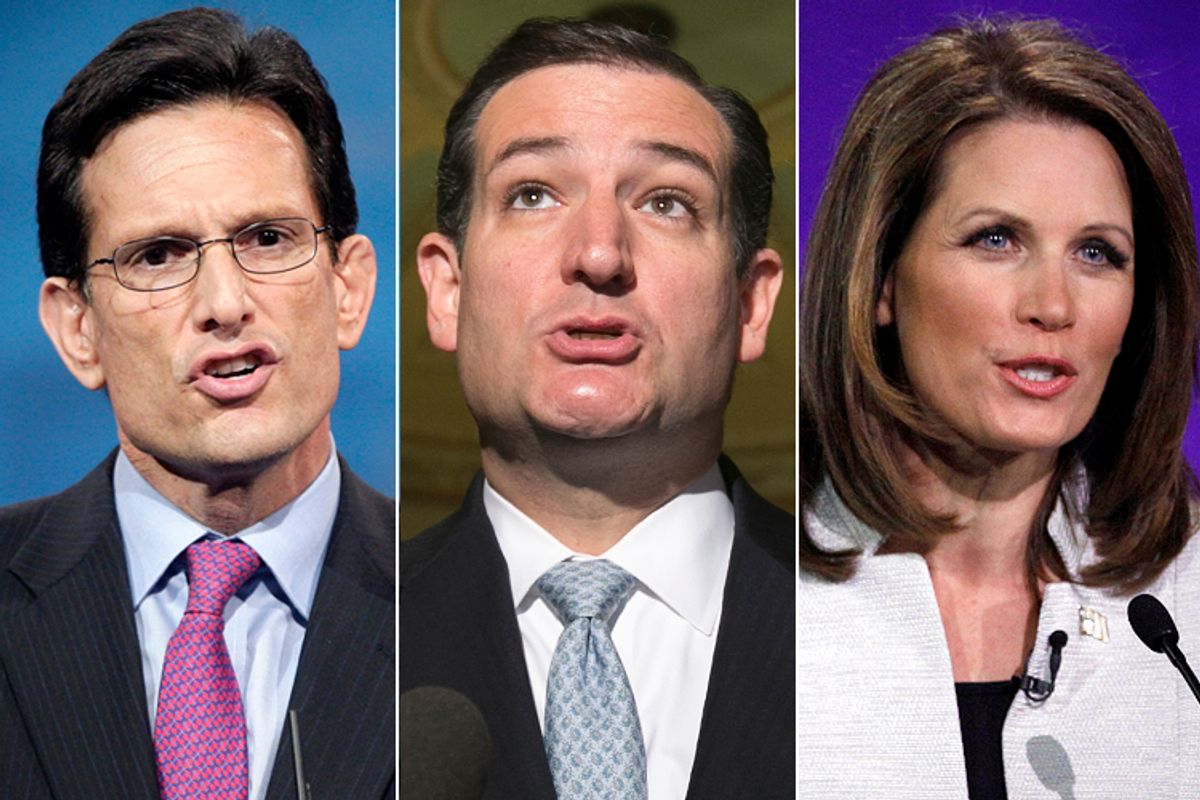This week you're likely to read stories and headlines suggesting that House Republicans will be voting to repeal the Affordable Care Act again, or are approaching their 50th Obamacare repeal vote or some variation thereof. President Obama even clowned on them for it in a speech to the DNC on Friday: "You know what they say: 50th time is the charm. Maybe when you hit your 50th repeal vote, you will win a prize. Maybe if you buy 50 repeal votes, you get one free."
And, yes, this week, House Republicans will again vote to delay the Affordable Care Act's individual mandate for a year -- or, more specifically, to reduce its penalty in 2014 to $0.
But this slightly lazy shorthand obscures the significant fact that Republicans will decidedly not be voting to repeal the Affordable Care Act in toto this week, and probably never will again.
We saw this coming long, long before the initiation of the law's core benefits. Prior to this year, voting to repeal the Affordable Care Act was a freebie. A statement without real meaning, but which nevertheless appeased wild-eyed reactionaries on the right. Now it comes with a cost. Now it's a statement of intent to annul millions of people's healthcare benefits.
You can't take that vote without pairing it with a plan -- not a promise, but a real, scorable plan -- to make all or most of those people whole. And Republicans probably can't do that.
Others have already noted that the Republican leadership's most recent promise to pass an Obamacare alternative has dwindled into a vague allusion to the importance of replacing Obamacare.
Huffington Post's Jason Linkins went to painstaking but hilarious lengths this weekend to document the Groundhog Day-like nature of the GOP's current predicament. Five years and umpteen failed "repeal" plans suggest that structural forces rather than intellectual laziness have deterred Republicans from coalescing behind a single Obamacare alternative. Building consensus is hard, angering stakeholders is unpleasant, campaigning against Obamacare is easy.
But the task is actually immeasurably harder now that Obamacare is the country's status quo health policy.
If Republicans had bothered to legislate prior to Jan. 1, they could have proposed to "replace" Obamacare with an unserious but familiar mix of conservative-friendly healthcare reform measures, and their biggest enemy would have been the Congressional Budget Office. They'd have faced easily avoided questions about the wisdom of swapping out a plan that will ultimately cover 30-plus million people for one that covers a fraction thereof, but those 30-plus million people would have all been imagined beneficiaries. Now a bunch of them are actual beneficiaries. Which means that in addition to all the disincentives that have discouraged an Obamacare alternative for five years, Republicans are now under enormous pressure to craft a plan that creates a comparable overall level of welfare as well.
I don't think the party is structurally capable of that. But even if it were, the legislative process would quickly reveal the amazing pointlessness of predicating conservative healthcare reform on the full repeal of Obamacare. For instance -- if you're attempting to cover tens of millions of people with private insurance, then at the very least it makes sense for each state to have an exchange. It probably also makes sense to write up some rules preventing insurers from selling people plans that don't really provide any insurance. You also probably want to include a mix of incentives to make sure people actually enroll. But all of a sudden we're well into the domain of Obamacare itself. We're actually talking about amending Obamacare rather than repealing it.
And here's where the chickens come home to roost on the right. For opportunistic reasons, conservatives have worked party activists into an incredible lather over the Affordable Care Act over the years, which means they can't now, without warning, implicitly admit that the law can be molded into something tolerable. Not repealing Obamacare is tantamount to surrender. Coalition politics and member management imperatives actually require GOP leaders to predicate Obamacare alternatives on Obamacare repeal.
This is self-evidently spiteful and unserious. It also requires spending money, which means it probably can't pass the House. But the alternatives are a) writing an Obamacare alternative that tosses millions of people off of their new health plans and leaves them with nothing, and b) not repealing Obamacare.
I think I know which one they're going to pick.



Shares